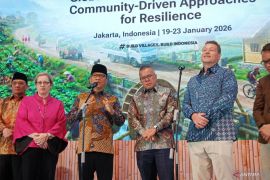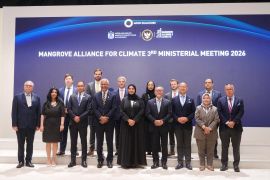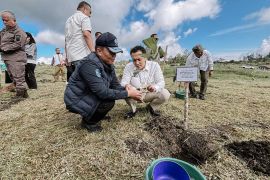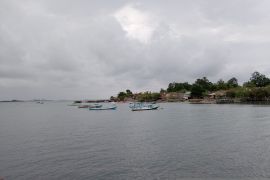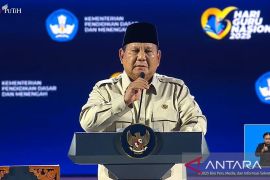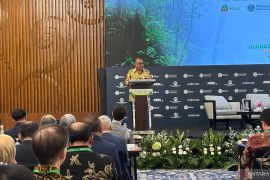Some 17 ministers and 11 deputy ministers of G20 countries were recorded to have attended the meeting that was held for an entire day at the Bali Nusa Dua Convention Center (BNDCC).
The meeting titled, Joint Environment and Climate Ministers' Meeting (JECMM), was also attended by 362 delegates.
The direct presence of the ministers for the environment and climate of the G20 countries reflects their support for the Indonesian G20 presidency and friendship with the Indonesian people.
Indonesia drew attention to three issues at the G20 Environment and Climate Ministerial Meeting: support for sustainable global recovery, improvement of environmental protection actions, and collaboration between countries for resource mobilization to accelerate environmental protection actions and address climate change.
The G20 forum could serve as a platform for Indonesia to prove, both domestically and globally, that the country can lead actions to save the earth.
Environment and Forestry Minister Siti Nurbaya Bakar said that Indonesia encouraged the need to apply a multilateral approach to confront various global environmental issues that affect countries during the G20 Joint Environment and Climate Ministers’ Meeting (JECMM).
Bakar pointed out that various global environmental issues had affected all countries, and they were in a position to solve them independently.
Hence, every country has the responsibility to maintain environmental multilateralism in order to resolve them, she stated during the G20 Joint Environment and Climate Ministerial Meeting (JECMM) in Nusa Dua, Badung District, Bali Province, on Wednesday.
Environmental multilateralism is the only mechanism wherein all countries, regardless of size and prosperity, are on the same standing and receive the same treatment, she affirmed.
Related news: Climate change losses could reach 40% of GDP by 2050: BI
The application of multilateralism in addressing environmental issues will provide a good opportunity for developed and developing countries to be heard, she noted.
To this end, Indonesia's G20 Presidency, within the G20 JECMM, also invited several other parties, such as the Caribbean Community (CARICOM) and the African Union.
These parties' concerns and interests are also important. All countries can contribute in the solution through several ways, Bakar remarked.
The multilateralism approach in confronting environmental issues is also the only method to effectively coordinate steps in handling various global challenges.
She urged G20 member countries and representatives from other attending organizations to bolster the spirit of mutual respect.
The minister also invited all countries -- developing as well as developed -- to contribute to efforts to address global environmental issues through collective action with the help of the G20 forum
Collective action and global partnerships are essential if we want to address global environmental challenges and lead the world towards sustainable recovery, she said.
The world is currently facing various environmental issues, such as population growth, water crisis, resource scarcity, and energy security issues, as well as environmental degradation, the minister noted.
Related news: PLN moves to mitigate climate change
Moreover, the world is reeling from the impacts of climate change that could exacerbate these crises, she said. The phenomenon can have an impact on the progress and development that has been achieved over decades, especially in developing countries.
The minister said that no country can be free from the impact of environmental issues or handle them on their own.
To this end, it is necessary to pursue environmental multilateralism to ensure that countries of various sizes and wealth stand on an equal footing.
Bakar reminded that great hopes have been pinned on the G20 forum regarding collaboration to deal with environmental issues.
The G20 needs to be relevant for the world, in general, and not for its members, she said.
Related news: Climate change research must consider conditions in society: BRIN
Chair Summary
The Joint Environment and Climate Ministers' Meeting (JECMM) of the G20 resulted in several agreements on overcoming environmental problems and controlling the impacts of climate change, which were summarized in the chair summary document.
Several agreements on environmental issues discussed today (August 31, 2022) are reducing the impact of land degradation and drought, increasing protection, conservation, and restoration of land and forest ecosystems in a sustainable manner to reduce the impact of climate change and loss of biodiversity and land damage.
The meeting also yielded agreements on increasing multiparty cooperation, capacity building, exchanging experiences and lessons, as well as developing multilateral agreements based on nature.
The meeting also discussed efforts to reduce pollution and environmental damage, waste management, sustainable water resource management, marine debris, marine conservation, and circular economy, Siti Nurbaya Bakar stated.
There is a session on finance specifically on how sustainable financing can overcome various climate crises. However, various aspects are deemed crucial, such as reform of the structure for international funding, Bakar explained.
Related news: Intensify cooperation to address climate change: Official
From the aspect of climate change, several agreements were reached regarding strengthening climate action, the role of budgeting for COVID-19 recovery to improve climate mitigation and adaptation, commitments to prevent losses and damage due to climate change, and continuing the Glasgow Dialogue.
It was also agreed to increase research, strengthen understanding of the relationship between climate and oceans, local and regional initiatives, involve groups vulnerable to climate change impacts, and strengthen engagement in marine dialogue.
Meanwhile, director general of climate change control (PPI) at the Ministry of Environment and Forestry (KLHK), Laksmi Dwanthi, said that the chair summary document of JECMM reflected the dynamics of various issues, including geopolitics, and included matters that were generally agreed upon.
The chair summary contained all 50 issues that G20 member countries reached an agreement on.
Several issues have been discussed since the first meeting in Yogyakarta, the second in Jakarta, and the third in Bali. The meetings resulted in 50 paragraphs for elements of the environment and elements of climate sustainability, Dwanthi stated.
Furthermore, the agreement resulting from the meeting will be delivered to the heads-of-state-level meeting for further discussion.
Related news: Minister asks countries to collaborate on energy transition
Related news: G20 environment ministers' meeting yields several agreements
Reporter: Azis Kurmala
Editor: Fardah Assegaf
Copyright © ANTARA 2022

